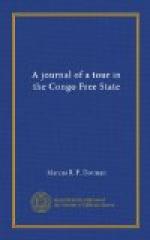It is necessary now to turn from the actual visual facts and to study the statements of others. While doing so however, we must bear in mind the main outlines of the history of the Congo Free State. The opening up of the Congo was entirely due to the initiative of King Leopold of Belgium aided by the explorations of the late Sir H.M. Stanley. In 1878, after Stanley’s first descent of the Congo, a society of philanthropists was formed called the Comite d’etudes du Haut-Congo but this was changed in 1882 to the Association Internationale du Congo. Stanley and a French officer, M. de Brazza, then both worked up from the coast at the same time and the former reached Lake Leopold on June 1st 1882, while the latter concluded treaties with the Chiefs on the north bank of the river and founded the French Congo.
The International Association of the Congo at once organised itself into an Independent State and on April 22nd 1884 a Declaration was made by the Government of the United States of America that it recognized the flag of the International Association as that of a friendly Government. At the end of 1884 and the beginning of 1885, Conventions were arranged between the Governments of Austria, Germany, Great Britain, Belgium, Denmark, Spain, France, Italy, Holland, Portugal, Russia and Sweden and Norway and the International Association of the Congo in which all those countries recognised the flag of the International Association as that of a friendly Government. It is therefore clear that the chief Powers of the World regarded the Association as an Independent State and negotiated with it as such.
At the same time the Powers of Europe were annexing various parts of Africa, and with the idea of regulating in a spirit of mutual goodwill the conditions most favourable for the development of civilisation and commerce, a Conference was arranged at Berlin by Prince Bismarck. All the Powers of Europe and the United States of America sent plenipotentiaries who sat from November 15th 1884 to February 26th 1885 and agreed to the General Act of Berlin of the latter date. In this it is decreed that all nations should enjoy complete liberty of commerce in all the territories constituting the basin of the Congo and its tributaries, and also in other parts of Central Africa mentioned, that slavery should be abolished and that the Congo river should be open to general navigation.
We shall have to refer to this Treaty later, but it is important to note here that the United States of America and all the great Powers of Europe had recognised the International Association as an Independent State before it was signed. Furthermore, before this date, Conventions had been signed with France and Portugal to arrange the frontiers between the territories of those Powers and the International Association. The General Act of Berlin had however nothing to do with frontiers at all, but stated the general principles which it seemed were best suited to the needs of the




